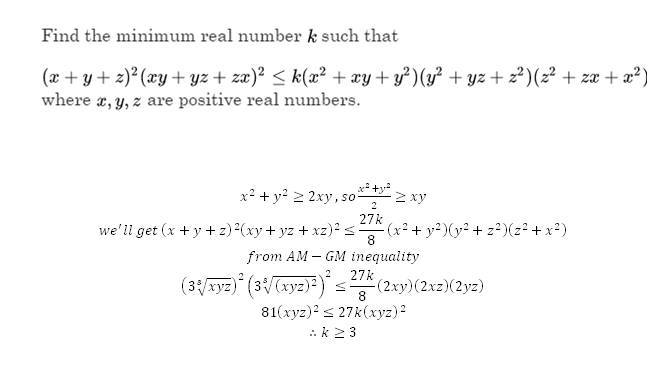Will triangle inequality work ?
Find the minimum real number k such that
( x + y + z ) 2 ( x y + y z + z x ) 2 ≤ k ( x 2 + x y + y 2 ) ( y 2 + y z + z 2 ) ( z 2 + z x + x 2 ) where x , y , z are positive real numbers.
The answer is 3.
This section requires Javascript.
You are seeing this because something didn't load right. We suggest you, (a) try
refreshing the page, (b) enabling javascript if it is disabled on your browser and,
finally, (c)
loading the
non-javascript version of this page
. We're sorry about the hassle.
2 solutions
I don't see how AM-GM can be applied. :P
I have solved the problem, but your solution is remarkable
WooooW! I'd never think this things! I've just applied AM-GM separately ( think about it), and x=y=z. Anyway, as Amritendu said, your solution is remarkable...
amazing solution. I used AM-GM treating each term of the LHS and seperately applying AM-GM inequality

Let a = x + y , b = y + z and c = z + x . a , b , c are the sides of a triangle. semiperimeter, s = 2 a + b + c = x + y + z
x y + y z + z x = ( s − a ) ( s − b ) + ( s − b ) ( s − c ) + ( s − c ) ( s − a ) = r ( r a + r b + r c = r ( r + 4 R )
In the above i used two results, namely-
i. ( s − a ) ( s − b ) = r r c where r is the in-radius and r c is the ex-radius of the ex-circle opposite to vertex C.
ii. r a + r b + r c = r + 4 R where R is the circum-radius.
x 2 + x y + y 2 = 4 3 ( x + y ) 2 + ( x − y ) 2 ≥ 4 3 a
Hence, r 2 s 2 ( r + 4 R ) 2 ≤ 6 4 2 7 k a 2 b 2 c 2
or A ( r + 4 R ) ≤ 8 3 3 k a b c [ A denotes the area ]
or 4 R a b c ≤ 8 3 3 k a b c
or r + 4 R ≤ 8 3 3 k R
or r ≤ R ( 8 3 3 k − 4 ) .
So we require 8 3 3 k − 4 = 2 1 [since r ≤ 2 R ]
Solving this we get k = 3 .
I think this problem can also be solved with AM-GM.